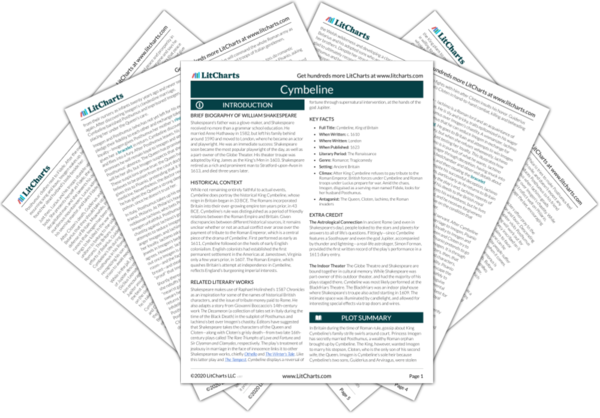Morality and Loyalty
Cymbeline is a moral play that prizes good intentions and punishes cruelty: the evil Queen fails in her plots and then dies, while the loyal and moral princess is allowed to marry her true love. However, despite the play’s resounding moral message, Shakespeare complicates traditional notions of morality and loyalty by showing that the value of both traits lies in intention alone: sometimes loyalty is immoral, while sometimes deception—when used with proper intentions—is necessary and…
read analysis of Morality and LoyaltyGender Roles
Cymbeline demonstrates an awareness that gender roles constrict the options of male and female characters alike. Ancient Rome—and, by extension, Roman Britain—was a patriarchal society. Men had absolute authority over their female family members, even holding over them the power of life and death. In Shakespeare’s time, men still dominated the most powerful positions in society, and they were taught to be warlike, decisive, and bold. Women, on the other hand, were expected to be…
read analysis of Gender RolesImperialism vs. Independence
At the beginning of the play, Britain owes Rome a tribute (money due to the Emperor to maintain peace). However, trouble is brewing—Posthumus notes that the Britons have a rebellious spirit, and they are better organized as fighters than when they first promised the annual tribute to Julius Caesar years before. Urged by the Queen and Cloten, Cymbeline announces to Augustus’ ambassador Lucius that he will refuse to pay the tribute. In response…
read analysis of Imperialism vs. Independence
Forgiveness and Reconciliation
Throughout Cymbeline, characters make bold decisions that are not easily undone or forgiven, such as Cymbeline’s banishment of his son-in-law, his punishment of his daughter, and his refusal to pay tribute to Rome. Despite many characters’ seemingly irrevocable actions, moments of forgiveness and reconciliation guide the play to its happy conclusion. Identified alternately as tragicomedy or romance, Cymbeline operates within these genres’ demands. Tragicomedies and romances tends towards the comic, and end in…
read analysis of Forgiveness and ReconciliationThe Gods and Fate
Ancient civilizations like Rome interpreted life’s events, both big and small, as the will of the gods. From household gods called lares (who looked over quotidian matters) to the Olympian deities (who determined the course of history), the Romans believed that the gods directed all aspects of human life. In Shakespeare’s time—when medicine was not advanced and government was dominated by the powerful few—life’s chances and mischances, from birth to death, rested in the Judeo-Christian…
read analysis of The Gods and FateNobility
Over the course of Shakespeare’s lifetime, questions abounded in England over the definition of nobility and the legitimacy of monarchical power. With the rise of the middle class, common people began to own land and goods, including garments which would have been unattainable in feudal times. In response, sumptuary laws enacted in Shakespeare’s day tried to delineate between who was noble and who was not—for instance, by limiting silks to the nobility and relegating wool…
read analysis of Nobility






